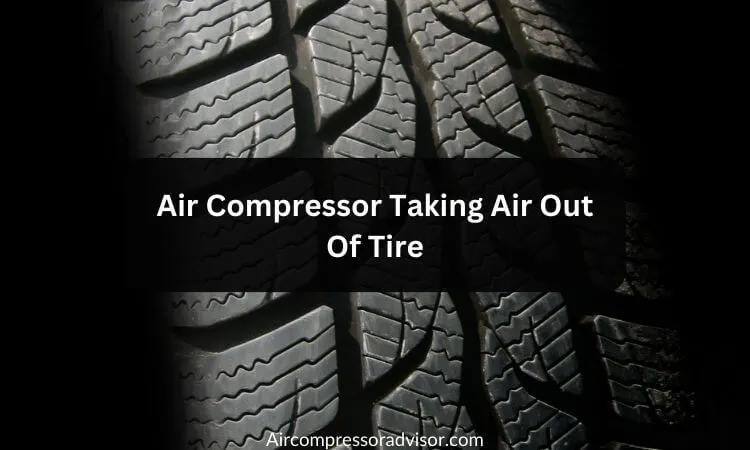Air Compressor Taking Air Out Of Tire (Causes & Fixes)

Air compressors are an essential tool for many projects and tasks from powering pneumatic tools to inflating tires. However, sometimes you might experience a situation where your air compressor is taking the air out of your tire instead of putting air into it and this can be frustrating and confusing but it's important to understand why this is happening and what you can do to solve the problem.
In this article, we'll take a closer look at why an air compressor might take air out of a tire, what causes it, and how to fix the issue. So, without any further ado let's take a look at it.
Why Is An Air Compressor Taking Air Out Of A Tire?
When you connect an air compressor to a tire it should start inflating the tire; however, in some cases, the opposite happens and the compressor takes the air out of the tire instead of putting air into it. This can happen due to a few different reasons which are given below:
Faulty Valve Stem:
The valve stem is the part of the tire that allows air to enter and exit and if the valve stem is damaged or faulty it can cause air to leak out of the tire.
When you connect the air compressor to the valve stem the air will escape through the faulty valve stem instead of filling the tire.
Leaking Tire:
Another reason why a compressor might take the air out of your tire is that the tire itself is leaking. If there's a small hole or puncture in the tire the air will escape through the hole instead of filling the tire.
When you connect the air compressor to the tire the air will continue to escape through the hole causing the air compressor to take air out of the tire.
Defective Pressure Gauge:
The pressure gauge on the air compressor is responsible for measuring the amount of air in the tire and if the pressure gauge is defective or inaccurate it might give you a false reading of the tire's pressure.
This can cause it to take the air out of the tire instead of filling it as the gauge thinks the tire is already at the correct pressure.
Incompatible Valve Stem:
Sometimes the valve stem on the tire might not be compatible with the air compressor's nozzle. If the nozzle is too big or too small for the valve stem it might not seal properly causing air to escape instead of filling the tire.
How To Fix An Air Compressor Taking Air Out Of A Tire?
Now that we've looked at the possible causes of a compressor taking the air out let's explore some solutions to fix the problem:
Check The Valve Stem:
The first thing you should do is check the valve stem on the tire and make sure it's not damaged or faulty and that it's properly seated in the tire. If the valve stem is damaged you'll need to replace it with a new one.
Check For Leaks:
If the valve stem looks okay the next step is to check the tire for leaks and you can do this by applying soapy water to the tire's surface and looking for bubbles. If you find a leak you'll need to patch it or replace the tire.
Check The Pressure Gauge:
If the valve stem and tire are both okay the next thing to check is the pressure gauge on the air compressor. Make sure it's working correctly and giving you an accurate reading of the tire's pressure and if the gauge is defective you'll need to replace it.
Check For Compatibility:
Finally, if everything else looks okay check that the air compressor's nozzle is compatible with the valve stem on the tire. If it's not you'll need to use an adapter or find a different air compressor with a compatible nozzle.
Frequently Asked Questions (FAQ):
Can An Air Compressor Damage A Tire?
Yes, an air compressor can damage a tire if it's not used correctly as over-Inflating a tire can cause it to burst which can be dangerous.
It's important to follow the manufacturer's instructions and only inflate the tire to the recommended pressure.
How Often Should I Check My Tire Pressure?
You should check your tire pressure regularly at least once a month as this will ensure that your tires are properly inflated and safe to drive on.
What's The Correct Pressure For My Tires?
The correct pressure for your tires will depend on the make and model of your vehicle and you can find the recommended pressure in your vehicle's owner's manual or on the tire itself.
It's important to inflate your tires to the recommended pressure as underinflated or overinflated tires can be dangerous.
Conclusion:
Facing this issue of the air being taken out of a tire can be frustrating but it's usually due to a simple problem that can be easily fixed.
By checking the valve stem, tire, pressure gauge, and compatibility you can identify the cause of the problem and find a solution. Remember to always check your tire pressure regularly to ensure your tires are safe to drive on and if you find this article helpful then kindly share it with others and have a nice day.